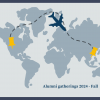How does the UP accommodate students with special needs?

Mar
10
How does the UP accommodate students with special needs?
In this blogpost, the life of students with special needs is discussed with the head of the Support Service and Disability coordinator at the University of Pécs, Csaba Magdali. We will take a glance at the adversities of inclusive education and their possible solutions, as well as acknowledge the changes in the operation of this entity with the onset of pandemic.
I’ll start off with first and foremost – the rights of the students with disabilities are protected by the Hungarian legislation, an important fact to keep in mind. Depending on the type of disability of a student, there are specific academic and examination benefits that an institution are obliged to provide (in cases of speech impairment, a written test can be substituted with an oral one, for example). This grants a handy framework where support service workers know their area of responsibility and are effective at assisting their mentees. More detailed information can be found at https://tamogatoszolgalat.pte.hu/en/content/study_and_exam_benefits
All in all, the support service appears to be a connecting bridge between the students with special needs and their full-fledged education. As Mr. Csaba Magdali highlights, on this journey, their students are encouraged to stay as independent as possible. However, when necessary, the university’s support service is ready to provide transportation, academic tools such as magnifying loops for visually impaired, and, most importantly, a community for those who struggle to make friends. As most of the students (there are about 100 signed contracts) under the provision of the service are locals, there is a pressing need for international exposure. Here’s why the entity welcomes foreign volunteers so warmly. “They gain some braveness to communicate in a different language,” says Mr. Csaba, “and I hope a wish arises in them to talk”. Unfortunately, this option is unavailable due to the current restrictions. Nonetheless, university’s support service tries its best to adapt and conduct all activities remotely. Mental hygiene service, clubs, meetings and even physiotherapy sessions are now held online for students with special needs. I find it truly wonderful.
I was curious on the ways how other students and teachers at the university can show their support thoughtfully. According to Mr. Magdali, “if a person has a problem, the best thing to do is asking questions”. “Everyone wants to be treated as an individual,” he states, and I believe this is the core idea from which any action shall stem. We already know that categorization might create alienation and stigma, thus, an equal treatment is what we want. From my part, I feel the immense importance of raising visibility of students with special needs and awareness on inclusivity via different channels. Let this blogpost be one.
Inclusive education is a way for everyone to find their paths in life. And it is an uphill task for the support service to do it on their own. “We used to be friends, but now we are more professionals because of the age gap between us,” shares Mr. Csaba. “That is the biggest challenge,” he says. Therefore, more younger people are encouraged to participate at joint events with our special fellow students. The doors of the office are open to anyone interested.
To conclude, I want to share a parallel from the Little Prince that Mr. Csaba brought up at the end of our conversation. Just like with the little prince and fox, it takes consistency, a big smile and a warm heart to form true ties with each other. Same goes to people with special needs.
It seems like the best we can do is really be friends. Because as living creatures, independent of physical or mental abilities, we all desire affection, belongingness and true connection.

Image taken from http://www.christineswilliams.com/2016/08/little-prince-fox/
Use this link to check the Facebook page of the Support Service at the University of Pécs: https://www.facebook.com/tamogatoszolgalat
May you and your loved ones stay safe and healthy!
Written by Diana Seitkanova
International Student Ambassador from Kazakhstan
BSc in Psychology
University of Pécs, Faculty of Humanities
kazakhstan@pte.hu
University of Pécs | Chancellery | IT Directorate | Portal group - 2020.














